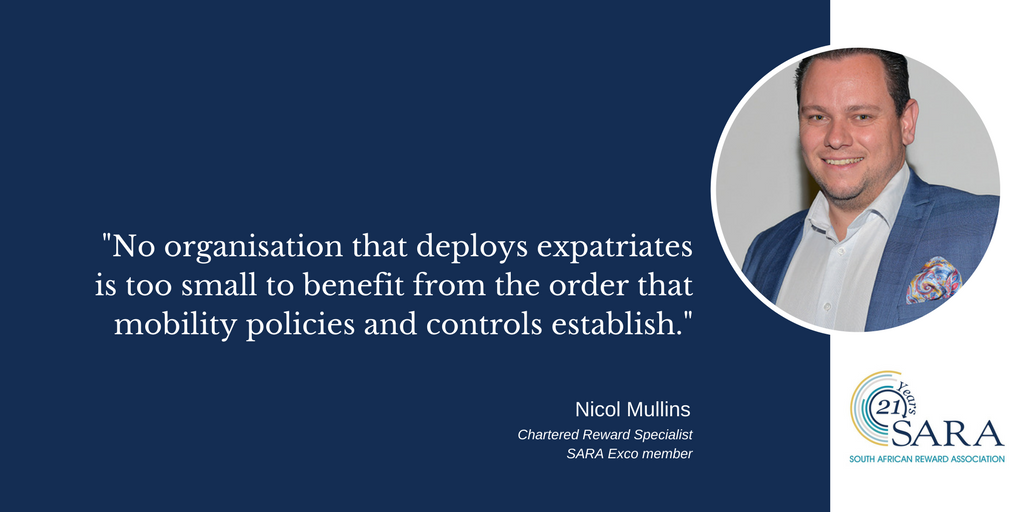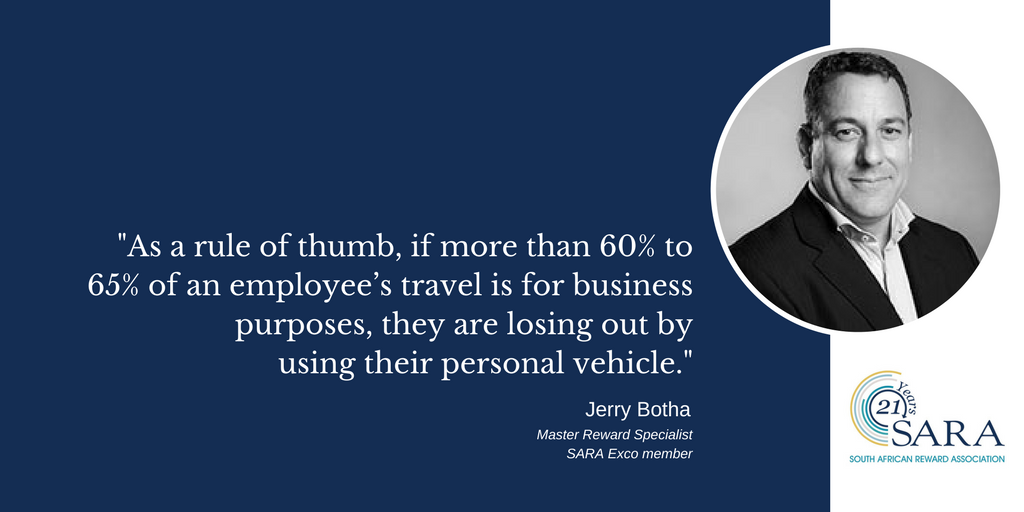|
Experts trained in how to balance the expectations of international workers with the strategic, financial and practical constraints faced by the employer are in high demand. The driver of this demand is the technology that makes a larger international mobile workforce possible.
“Aligning an expatriate’s reward expectations with company policy is an intricate science,” says Nicol Mullins, Chartered Reward Specialist and Chairperson of the International Mobility Group at the South African Reward Association (SARA). International assignees must get a fair pay package in return for their willingness to uproot themselves from their local support system. Employers should however not hand over a blank cheque. If a company pays for staff to take their pets on a foreign assignment, does that include the relocation cost for an employee’s horse? Would a female employee be able to develop her career in Saudi Arabia? Will a country's high tax rate overwhelm the benefits of an otherwise handsome remuneration package? Considerations like these are often overlooked when dealing with expatriates, especially for urgent deployments. This is where the services of an International Mobility Reward Specialist prove invaluable. According to Nicol, expatriate reward programmes must be based on a comprehensive set of policies for each foreign destination to which employees may be assigned. “Mobility specialists are businesses’ architects of expatriate reward programmes,” he says. “They are also the custodians of the standard by which all international deployment decisions will be made.” A Mobility Reward specialist develops the what and how of expatriate remuneration and benefits; the International Mobility Policy and the International Mobility Framework derived from it. The International Mobility Policy is informed by a large body of tax, immigration, legislation, cultural and other data about selected destinations, gathered and correlated by the mobility specialist. They consider rewards in terms of identified trends, best practices and their organisation's own HR remuneration directives. “It is because of the complexity of the knowledge required that expatriate reward programmes should be treated differently than local reward calculations,” explains Nicol. Coordination While the mobility specialist must have a good knowledge of each subject their policies address, it is impossible to know the intimate details of visas, legislation, tax or lifestyle for every target location. For this, they build and leverage a network of validated and reliable foreign area specialists, like relocation agents, tax advisors and environmental adjustment consultants. “These service providers are like the pieces on a chessboard,” Nicol explains. “Without a dedicated organising authority like the mobility specialist, companies would struggle to coordinate the efforts and interests of all stakeholders.” Protecting the investment Ultimately, an expatriate is deployed to achieve a corporate goal, making their remuneration only part of a larger investment. Many foreign assignments fail because an accompanying partner is unable to adapt to an unfamiliar lifestyle, culture or surroundings. Another common problem is the lack of a visa for the partner that allows them to pursue fulfilling their own purpose. “It is a pity when either the rewards or the total investment are devalued or even rendered worthless by unforeseen problems that could have been anticipated,” says Nicol. “A mobility specialist will track cases where a successful transition was achieved in a specific environment. They will also be able to identify the best solution to potential problems, ensuring the employer’s objectives are not derailed.” Bringing order The greatest advantage of employing an International Mobility Reward Specialist is that they prevent the foreign assignment dynamic from devolving into a chaotic and costly mess. “No organisation that deploys expatriates is too small to benefit from the order that mobility policies and controls establish,” concludes Nicol. ENDS MEDIA CONTACT: Juanita Vorster, 079 523 8374, [email protected], www.atthatpoint.co.za For more information on SARA please visit: Website: www.sara.co.za Twitter: @SA_reward LinkedIn: South African Reward Association Facebook: SARA – South African Reward Association
0 Comments
Which is better - company car or travel allowance? It’s a question that regularly plagues both employers and employees. “In light of new SARS requirements for travel reimbursements, it needs to be carefully revisited,” says Jerry Botha, Master Reward Specialist and Executive Committee member of the South African Reward Association (SARA).
Important changes Botha is referring to the removal of the 12,000 km limit that was previously applied to reimbursements. If travel exceeded this distance was reimbursed at a per kilometer rate higher than that prescribed by SARS, or other travel allowance was paid, the total amount needed to be reflected under code 3702. However, reimbursement paid at or below the prescribed rate was declared under code 3703. Either way, PAYE was not deducted from the employee’s income. From 1st March 2018, if an employer reimburses staff at a per kilometer rate higher than that prescribed by SARS, they have to split any reimbursement into two components. The portion that falls within SARS’ rate must be declared using code 3702 while the portion above that rate must be reflected under a new code, 3722. If the employer also pays a fixed travel allowance, this is declared separately with code 3701 as usual. Under this new system, the excess reimbursed portion is subject to PAYE just like a fixed travel allowance or fuel, garage and maintenance cards. Reimbursement at or below the prescribed rate is reported using code 3702 as before. “More important than the new code and method of calculation is the removal of the 12,000 km limit and the introduction of PAYE on the excess portion,” says Botha. “These changes affect the reward dynamics significantly.” Employers should therefore review the new rule to ensure their workers are enjoying the best tax and cost benefits, especially those who reimburse certain segments of personnel well over the prescribed rate. It may be that a lower reimbursement rate puts more money into an employee’s pocket, as there is no PAYE thereon and the reimbursement does also not have to be substantiated by a logbook on filing of the employee personal income tax return. Either way, the compliance around the new rules makes it important for all employers to enforce compulsory employee logbooks, even where the employee does not claim on a tax return. We know employer PAYE audits is a SARS focus area and employee logbooks is critical for the employer to evidence tax compliance. Is it time to offer a company car? In seeking travel compensation that is fair and rewarding to a worker, it is a good opportunity to decide if they would benefit from a company car. “As a rule of thumb,” advises Botha, “if more than 60% to 65% of an employee’s travel is for business purposes, they are losing out by using their personal vehicle.” Typically, fuel only makes up 50% of the total cost of running a car. Additional expenses, like maintenance and insurance, or depreciation on the vehicle are not covered by travel allowances, reimbursements or fuel cards. A highly mobile employee may also have to bear the early replacement costs of their private car. The vehicle buying habits of South African employers and employees remain routed in emotion and decisions are not made based on running the numbers. This causes the employer to be burdened with too high fleet costs, whilst the employee is mostly significantly out of pocket, often only realising the mistake when they want to trade in their vehicle. According to Botha, there remains a sweet spot for travel reimbursement, reimbursement with travel allowance and company vehicles. The employers who care about the cost and staff allows all three, as part of their Total Package approach. Especially for employees on high business travel, the employee is severely disadvantaged where not on a company vehicle. “If an employer does the calculation correctly,” says Botha, “they will see that a company vehicle is the best reward strategy in this case.” Botha advises organisations to engage their reward specialist to ensure their employees receive the appropriate package for their needs. ENDS MEDIA CONTACT: Juanita Vorster, 079 523 8374, [email protected], www.atthatpoint.co.za For more information on SARA please visit: Website: www.sara.co.za Twitter: @SA_reward LinkedIn: South African Reward Association Facebook: SARA – South African Reward Association |
Archives
March 2023
Welcome to the South African Reward Association newsroom.
Categories
All
|



 RSS Feed
RSS Feed